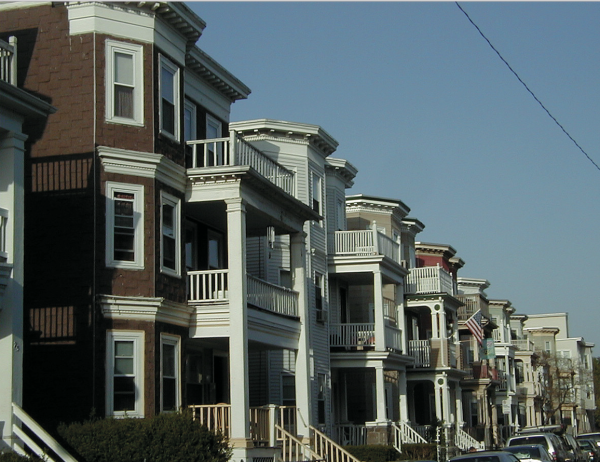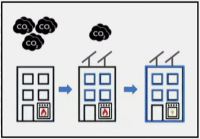June 1, 2022

A view of three deckers on Taft Street in Dorchester. Reporter file photo

Updated June 1, 3:24 p.m.
A $20 million pilot to retrofit three-deckers and other multi-family homes for energy efficiency is included in the latest round of federal funding before the Boston City Council.
Earlier this year, Mayor Michelle Wu announced the “nation-leading pilot,” which is bundled in a $206 million package of other affordable housing investments. The funding would come from the American Rescue Plan Act (ARPA), a federal pot of money aimed at assisting states and municipalities in weathering and recovering from the Covid-19 pandemic. ARPA funding has to be obligated by the city by the end of 2024 and spent by the end of 2026.
This proposal takes aim at two of Wu’s priority areas: affordable housing and climate resiliency. Though other retrofit programs exist, like the Massachusetts Clean Energy Center’s triple-decker pilot which pursues high-efficiency electric retrofits of the housing type, this Boston-based pilot is a new enterprise for the city in line with its green goals.
Buildings selected for the pilot would include deed restricted housing, naturally occurring affordable housing, and public housing.
“This particular program would be dedicated funding to address gaps in the available financing for deep energy retrofits of affordable housing and would also have a focus on helping to allow residents to stay in place through that work,” said Joe Backer, senior development officer with the mayor's Office of Housing in the neighborhood housing development division.
Still in its infancy pending funding, the pilot would explore flexible options to bring “deep energy retrofits” to existing housing stock, targeting income-restricted housing. Given the diversity in housing types, even between three-deckers, officials expect the pilot to involve building-by-building energy assessments.
Deep energy retrofits are holistic approaches to making structures themselves more energy-efficient. So, rather than an individual just swapping out lightbulbs, it may also involve better exterior cladding to make sure the house is well insulated. Certain homes may be modified for different fuel sources, prioritize more efficient heating and cooling, and across the board more efficient appliances.
According to the presentation before the council, the $20 million could fund these retrofits for about 300 housing units.
Reducing emissions through better building practices is already a priority for Boston. This project explores avenues for smaller buildings to come more in line with standards set by the updated Building Emissions Reduction and Disclosure Ordinance (BERDO). BERDO targets larger buildings with mandates to reduce emissions and eventually achieve net-zero.
The pilot would not laser-focus on the “iconic” three-deckers, according to the city. Though in a city where buildings account for 70 percent of greenhouse gas emissions, its most prevalent housing stock is a good place to start.
“There will be opportunities for this program to impact other sized buildings – it's not meant to be exclusive to the triple decker,” said Jessica Boatright, deputy director of neighborhood housing development in the Mayor’s Office of Housing. “Rather, the triple decker is meant to be emblematic of the commitment to impacting the largest number of buildings possible to reduce the city's overall carbon footprint.”
City officials emphasized that the pilot is building on existing partnerships and will be a joint effort between the Environment Department and the Office of Housing. The housing office will oversee implementation.
“What is a little bit new about this is being able to focus more intentionally on small-scale affordable housing and having a program in place that is really specifically looking at existing buildings of existing housing,” said Hannah Payne, carbon neutrality program manager in the city of Boston's environment department, “so that we can focus in on that as a city and identify ways to make sure that we are decarbonizing affordable housing and bringing the benefits that come with that to residents: improved indoor air quality, lower energy bills, things like that”.
The City Council discussed the affordable housing funding package on Wednesday (June 1) afternoon. If the ARPA dollars are approved, city officials say they can start immediately to flesh out the pilot, which will “serve as a proof of concept and build momentum for future efforts to upgrade the city’s housing stock and achieve Green New Deal goals,” according to the presentation.


